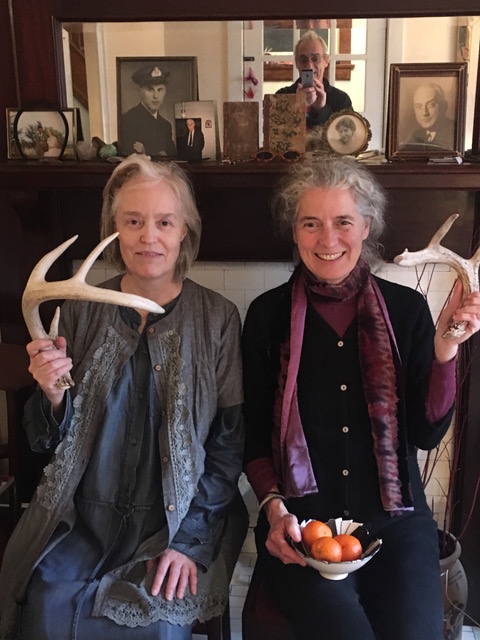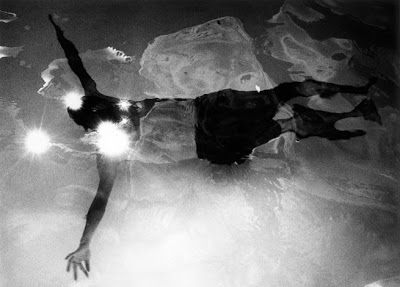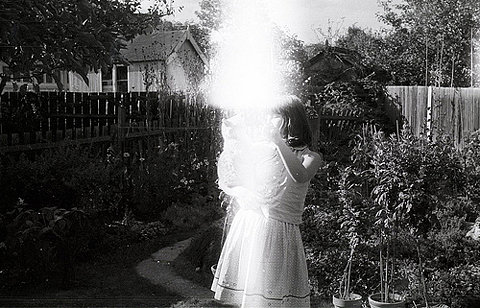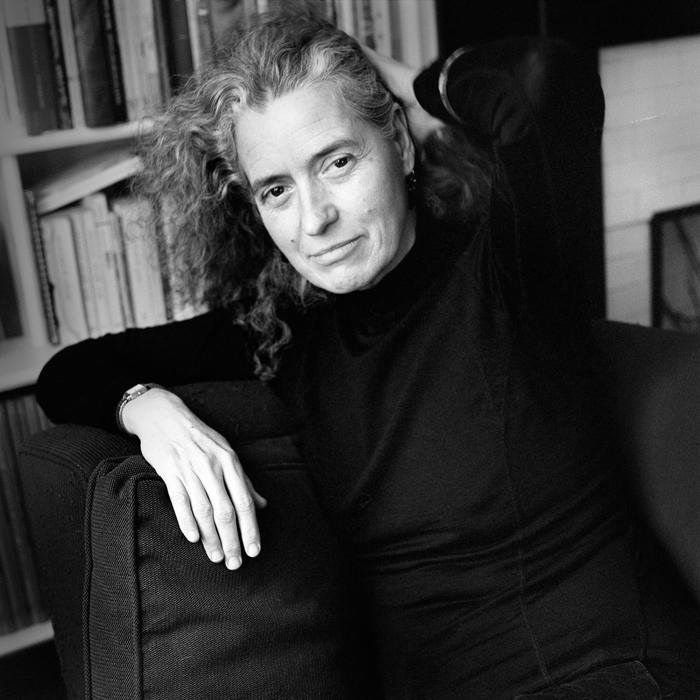Sister Language
Booklaunch September 18, 2019
Problem
Let’s begin with one of the first things that Christina writes in the book. I take it as a kind of pronouncement, a mini-manifesto, that is at the same time a question. How else to begin, except with a question that can’t be answered, or that is always being answered? In a short paragraph that acts as a kind of prelude to the book, Christina mentions being schizophrenic, and announces her project: “to be writing from inside the problem.”
Problem is from the Greek problema – a task. A task is something that needs to be fulfilled or performed. How do you perform a problem? Perhaps you allow it to speak, even to write, as Christina says, “from inside the problem.”
From the Greek problema: it means a task or a question. A problem is also a question. To whom is the question posed? Who is Christina asking this question of? Or: let’s put it another way: when the problem speaks, who is listening? Who could bear to listen?
Maybe a sister? A sister committed to co-creating a sister language.
Exist
Christina makes many astonishing claims in this book. For instance, she writes that she exists because of her language. She writes: “The proof that I exist is in the transitions from utterly random… language potential, into whatever utterances I’m making.” She lives in this transition, this space between all those words and the words that actually come out of her mouth. As if she were being spoken by language.
It made me wonder: why would you need proof? Why would you need proof that you exist? And if you could come up with this proof, who would you give it to?
I made a list of possible recipients: a tree, a building, a public square… Or of course there’s always family. As the old TV show used to say: All in the family.
And for every family a family dynamic. What is the family dynamic? The movement, the action, what is the gesture of family?
Push and Pull
Push me pull you. The old in out. Martha – Martha Baillie, the co-author with Christina, arrives in the book with a push against Christina’s door. Her sister is being pulled meanwhile – there’s a push and there’s a pull. Christina’s being pulled by what she calls “the random.” And something, she doesn’t know what it is, pulls away from the random. There’s a pull in one direction, and there’s a pull in another direction, and that’s who I am.
The image that I see is someone who is being pulled apart. Pulled from both sides now. I can feel the fear in my body, when I read that this act of being pulled apart is what she names as herself.
Body
Towards the end of the book Christina writes: “I felt I could experience existence only as language seen by language.” Experience is language. This shirt, this hand, your face. Your face is a f-a-c-e. Not a description of reality, but the reality of description.
But in place of some postmodern game, this sister makes explicit, she states plainly, what is at stake in her writing and her speaking. She writes: “For months I was barely held together by this message I typed up.”
What I hear in this phrase: is a picture of a self that is dispersing, that’s moving away and disappearing, it’s no longer contained, it’s no longer just in here. I don’t know about you, but there are many things I try to do to pull myself together, and most of those activities are related to my body. When I fail better again with my backhand in tennis. When I’m eating and I can taste my food, instead of tasting my distraction, tasting my impatience, or even someone else’s impatience. My body is my personal Disneyland. It offers me the consoling fantasy that I’m one person. So when I read this line: “For months I was barely held together by this message…” I can’t help wondering: what happened to your phantom body? When exactly did you become a ghost?
Of course there are some of us in this room, too many to count in this city, who are also ghosts. There are so many ways to lose a body, to have our bodies taken away from us.
It made me wonder about writing this book. To write a book you might begin with every word, with what Christina calls “the random” and then you start lining them up, you put them in a sequence and bind them together. What could be more bound than a book? But what if you are always unbound? – “barely held together,” being pulled by the random, pulling at the same time against the random. What does it mean to allow your words to be bound, when words are all you have, when words r us? They might mark you like a territory, but the territory keeps changing.
The question I wanted to ask is:
If you are being “barely held together by this message,” by language, what does it mean to commit yourself to writing this body, to write a book?
Can you write a book if you don’t have a body? Is that what they meant when we read in the 1960s that the author was dead? The author, the authority, the one that knows, in other words: the mother or father. If the author is dead, we might have – in place of the parents, brothers or sisters, in place of the writers – we might have readers and their radical acts of interpretation. Perhaps what “I am” is an ongoing series of interpretations. “Barely held together by this message.”
Reader
I have to admit I’m not a very good reader. I’m not a solid citizen even though I had this duty to perform, to show up tonight. I’m an artist, so often I just start reading somewhere in a book, I am also pulled by the random. And then I just skip ahead or behind. For Sister Language I read the front and the back of the book together. I would read a little of the front and then skip to the back, and then skip to the front again. And then I would watch Roger Federer – you know the great Swiss tennis player? – hit backhands on Youtube. It’s one of the things that holds me together. Because I don’t have the strength, as Marguerite Duras said, when someone asked her why she wrote, I don’t have the strength to do nothing. And I don’t have the strength of Christina Baillie, who found herself unravelling, coming apart and then daring to write about it. I crouch inside my fears and habits, I watch Roger hit the little green ball back and then I can pretend to be a person again.
Mike
I remember my friend Mike complaining about literary reviews. Like many artists I know, one of his favourite things to do was to complain. I think our friendship was based on my not interupting his beautiful monologues of complaint. One of the things he loved to complain about was book reviews. He said that books are made out of words and sentences, but you’d never know that by reading reviews.
This book talks about books and about words, and the pages the words appear on and the pen or typewriter or computer that the words come from. The conditions of production, the relentless questioning of form means that the sisters in this family live in the land of modernism, not unlike the French literary club the Oulipo (Workshop for Potential Literature), with its self-made rules, a language in conversation with itself.
How I wish that Martha and Christina could have met Mike, I think they might have found a lot to talk about. Mike wrote as if his life depended on it, and that froze him, it completely incapacitated him. As soon as he starts to write, the stakes were just too high.
“Dear Sister,
I find it increasingly hard to respond to your texts, as they release an energy that knocks me flat. I emerge from your written environments, unconvinced of the need for coherent prose. A mole resurfacing from the pleasure of tunnelling, of tossing word clots, my eyes tiny, ears hidden, bare nose nosing, a mound of language left behind as sole evidence of my possible presence.” Possible presence? It seems both sisters are worried about existing. These are Martha’s words, written in response. I think you can feel, even in this short passage, the push and pull of this language. One pill makes you larger, one pill makes you small, another turns you into an animal. Martha uses this word “emerge” – I emerge from your written environment. This sister is a world that one enters, completely, whole-heartedly, leaving nothing behind, and needless to say there’s going to be a risk, because this touch, this contact, is going to create changes that cannot be predicted.
Contaminate
In order to begin they’ll need a method, some ground rules. So the first rule is: you first, me second, or at least: one after another. This is how Martha writes about it on her page: “She (Christina) has asked that her writing occupy one page and mine the opposite page, to prevent our words from ‘contaminating,’ to stop one text from bleeding into another.”
Contaminating? How do you contaminate a word? It made me wonder how I could read this book without bringing my own words into it. Without contaminating it. What does an uncontaminated book look like? Is that like: a book that nobody reads? Or a book that everybody reads? There is such vulnerability, such openness, in this body of language. As soon as it makes contact with anyone else, shazam, contamination happens, not to mention bleeding.
In 1951 Jack Kerouac wrote On the Road – the story was that he’d taped together a 120’ roll of tracing paper, wound it up into his typewriter and started blasting away. Which prompted Gore Vidal to remark: he’s not a writer, he’s a typist. In this book Christina is a typist, her words appear in blotchy inked passages hammered into the page. Parts of words might drop down a line or two, creating new word geometries, new possibilities for combination and collage. Martha calls them “graphic impulses.” But Martha writes her words on a portable computer. Like Frederic Jameson’s famous postmodern pick-up truck, the one that can pick up anything at all, the laptop can create pictures or sounds, photos or live feeds, text messages or graphic displays. As if the computer was invented to respond to a schizophrenic population that required more possibilities. Though of course the offer of freedom is only the gateway to more rules. If Christina’s typewritten hammers are the call, Martha’s computerized lines are response, though sometimes it is the orderly computer rows that are calling out, newly disordered, jumping from subject to subject with a new agility, a new freedom.
In order to speak to her sister, it seems that Martha needs to speak to language itself. And speaking to language means looking at her own words, the grammar even, the deep plumbing.
“To a man beside me I confessed that my backpack was full of stones. He often carried a bag of cat litter when training for a hike, he said, but also mentioned how closely this march was being watched. He advised me to “swim” back up the demonstration and leave discreetly, or else “shed” the stones then rejoin. I stepped out of the demonstation, found a large concrete planter on the sidewalk, and convinced a man I’d stopped to hold the books I pulled out of the top of the pack. Then I wrestled out a field boulder, big as a child’s head and wrapped in a read and white tea-towel, slipped it and my other stones, one by one, under the foliage. The man with the books was announcing loudly, “I don’t know her! I don’t know her!” My pack almost weightless now, I continued on the march.”
Christina says, she insists, that what matters most is motion, in other words, what is in between the words, or what the words are pointing to. She writes: “I celebrate what I can do and love to do: try to put language on the page in such ways that it is in motion.” I hear in this phrase an echo of Deleuze and Guattari who were trying to find a picture of someone undergoing therapy. They were looking for an image of the patient. And what they arrived at was a piano player. The hope of therapy, they claimed, was not to churn out virtuoso piano players. The hope was to provide the conditions so that the piano player could keep playing. They might stumble, they might start playing in the wrong key, it doesn’t matter. What matters is that they keep playing. The point of therapy is not about curing problems, but to give you the tools to keep taking the next step. Or as Christina writes: “try to put language on the page so that it’s in motion.”
To give movement to what is not moving. To breathe life into the dead. To create a resurrection.
Her voice sometimes reminds me of Beckett’s trilogy of novels, written just after the war. Every heave and crack and gesture of the body, of the chair she’s sitting on, the colour of the sky is noted. These details are also a way of writing about the body, by writing what is around the body. The family house the sisters used to live in, and that she is still living in. She writes about the house as if it were her body. As if this house body was also part of the act of writing. The house is writing.
Semi-colon
Here’s a moment that begins with a kind of joke, it’s a moment of fun, and then it makes a turn into something so very serious. “I notice I just used a semi-colon, so perhaps I’m the same self who’s been writing this until today; (semicolon) Riddle me this. Who else has ever used the semicolon as a punch line? The sentence is a mirror that she looking into, trying to find traces of the self there.
Bridge
Christina writes that the book is a “bridge I’ve been needing between myself and human experience.” As if her experience was not entirely human. Or maybe that human experience is not entirely hers. Sometimes when I’m floating through a bookstore, trying to touch the random, to find something I shouldn’t find, I pick up a volume and wonder: why did you have to write these words? But with this project, there’s no mistake. The stakes are so large. They couldn’t be larger.
One sister is made out of words. The other says to her “How to choose a word without possessing it?”
Archive
The alternating current of writing – oh no please after you – is also the occasion for archive fever. For Martha I think it means conjuring her history as a sister, and of course her history as a writer. I can feel her leaning into her sister’s words, and allowing the graphical spluges, the ratatat alliterations, the double meanings and word plays – I can feel Martha’s storytelling impulses rubbing up against her sister’s jazz, and loosening as a result, even falling apart sometimes, and not being afraid to fall apart. One of the qualities of this sister language is that it’s not afraid to take a chance, to risk incoherence, to try out another startling maneuver. (I can feel the gravity of the random at work here too. )
For Christina the archive is more tangible. For fourteen years she has been filling binders with hundreds of pages of words that no one has seen. There are so many pieces, typed up explosions of words carefully arranged into plastic sheaths clipped into binders. Along with cut-out collages, found photograph collections, graphomania work outs.
Sprinkled throughout the book, bolstered by the attentions of Martha’s careful reading, which is also Martha’s writing (isn’t every writing a form of reading?), Christina launches another midnight foray into the archive, which she dishes out in this book, and then she footnotes it, she provides an afterthought or three, for instance:
“Here X addresses (oh, X = Christina, now dressed up as a man), Here X addresses his obsession with an excruciating aspect of schizophrenia, whereby many sufferers are never free of a sense (a visceral conviction) of their own unreality. X has expressed this as an inescapable conviction (‘inexculpable convictshun’) that ‘the X-consciousness’ (‘tee X-con shushh… ness) is nothing but ‘a compound of crisscrossing thoughts randomly fired into it by surrounding human-minds, animal-minds, bird-minds and thing-minds’ (‘ache-ack! a cac- omp-pound of crystcrux-sing totes rant-homely f’ired-into eat boys rounding hume-wan mints, a-nimble mints, b’herd-mints ond Tsing-Tsing-mints?). Note that in ‘Tsing-Tsing’ X efficiently draws a reader’s attention simultaneously to: incarceration (Sing-Sing Correctional Facility), singing, teasing, and narcolepsy (induced by tsetse flies).”
So: what does it look like? The long uncovering, the buried secrets of her 14 years finally unearthed? Like fractured poetry shards and word sprays. Like an energized drip canvas of language. She is fighting for her existence as she has already made clear. And if her face-to-face contact is nearly zero, she is carrying on a deep conversation with the modernists, whose sometimes forbidding prose echoes her own schizophrenic alphabet. Thank you Gertrude Stein, thank you Mr. Joyce, thank you Sam Beckett. Some of my best friends are books. Sometimes I let them read me, I long for them like a lover.
Warm
Christina says that schizophrenia is not a warm place, don’t expect that from me sister. She draws a line, she cuts a figure of the two of them. The only way we can be close is to be separate. A lesson many of us learned early in our lives. And yet these pages are filled with what I can only name as gratitude, and with a warming surprise, that she is actually in a push and pull, I mean: communicating with another human-mind.
There are so many moments of pleasure and discovery. Oh, it’s you. And of course, like every love story, the discovery of you, is also the discovery of me. Somehow you’ve turned me into a secret, so I can feel myself again. The pleasure and danger of feeling myself again.
“December 28, 2017
You have no idea (or perhaps you do have some idea)” – here is another exemplary Christina sentence. She says “you have no idea” and then she unsays “or perhaps you do have some idea”. The big print giveth and the small print taketh away. This is the push and the pull, which is the movement of language, which is the movement that I am, the movement that is making the self. Let’s go on:
“You have no idea (or perhaps you do have some idea) of how thrilling this is for me. (this meaning the book) This letter format, you the addressee and addresser, is making it possible, feasible, for me to produce this legible prose; it feels strange, as if I’m in some alien skin, but I want to grab, grasp at this strange and no doubt temporary ability.”
It seems that Christina has gained a new super power. She calls it “legible prose.” Perhaps after all these years she’s allowing herself to be read. There might even be an embrace of contamination. But after 14 years of writing without an echo, without reader or listener, she is allowing something else to happen. And there is a palpable, nearly physical delight and delirium in the act of sending her words to her sister, who listens to them by writing alongside.
Of course it also comes with an infinite responsibility, a weight. What does it mean to be the only person who someone speaks to? What does it mean to be the last two speakers of Sister Language in the world?
“My years of nonstop isolated languagemaking.”
Christina writes from a computer in the library: “My years of nonstop isolated languagemaking.”
Peepshow
How does a book present itself to a reader? It’s something that’s closed, isn’t it? So I guess the act of reading begins with opening, opening the body of a book. But what if a book doesn’t want to be opened? Or perhaps the fundamental impulse is to want to be opened, and at the same time: please, don’t open me. It’s yes and no, it’s back and forth, is this the movement?
Because of the catastrophe of Christina’s death, and because it happened in the perilous twilight period between “finishing” the book and its printing and publication, and most of all because she could not manage the pulling, the naming, the random, whatever it was, she decided to end her life, so the book sometimes felt to me like a crime scene. I felt guilty for holding the evidence in my hands. I felt implicated somehow, like I was part of a train of events.
Even though we never met, I’m afraid to turn her joys and pleasures, the delight she takes on riffing out rhymes and alliterations, I’m afraid to turn her playfulness into clues. To impose a story that leads to The End. The book is a haunting, the last words, but also a kind of accusation. It seems the reader, or at least, this reader, has come too late. Or that I asked too much, wanted too much, without even knowing I was asking.
Of course every book is a memorial, it is a mark of the past, a trace of something that’s been left behind.
Ok here’s the last section, which is too long, sorry. It’s called Elephant.
Elephant
The elephant in the room of course is the room itself. At a book launch, the author appears and oh please oh god oh god please don’t read from your book and then as soon as they do I just fall asleep right away. I’m sure it’s just me.
My feeling is that people don’t come to a book launch to hear the author read, but to hear them chitchat, preferably unrehearsed, please say something funny, and perform yourself. It’s as if the book didn’t contain enough words, as if the book couldn’t speak for itself.
But I have to admit that most of all I wanted to have Christina stand up here, and say anything at all, or read the telephone book, just to feel the grain of her voice before setting off across these snow white pages. How did she put it? “There’s so much (mulch) of everything – my years and years of nonstop isolated languagemaking, the incessant celebration of mourning.” Perhaps language was invented so that she could exist, and that we could grieve that living, which is also, as she takes pains to point out, a place of dying. The push and the pull.
Being here makes me think that: there’s someone I really want to hear from. I need to hear Christina. But she can’t be here, so someone else is doing the talking. I wonder if I’ve spent my whole life in that state, or at least my whole family life, waiting for the person I need, and listening to someone else.
Could it be possible, even in this elephant of a room, where the survivors have gathered, to feel the push and pull of these sisters, this sister language, and say yes, and say thank you, and say it’s enough now, your work is done, now it’s time for someone else to do some of the lifting.
Last paragraph.
There is something in this book that can’t be contained, that can’t be held on a page, even if it is “only” language. Even if it’s only made out of words. There’s something unbound, something wild, and an unexpected tenderness in the midst of that wildness. To be invited to witness, to be allowed to share the experience of these two sisters in the playground of this book, it feels so rare. I want to say thank you to Martha for making the impossible necessary, for taking the risk, for keeping faith, for answering the call, even for finding the courage to come tonight and hold us all with your dazzling talent.




